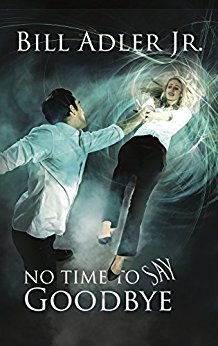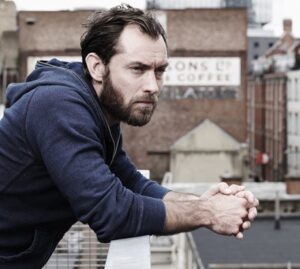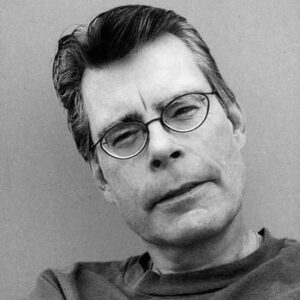No Time to Say Goodbye received a 4+ star review, making it an IndieReader Approved title.
Following find an interview with author Bill Adler Jr.
What is the name of the book and when was it published?
No Time to Say Goodbye, a time travel, love story novella was published in April, 2017.
What’s the book’s first line?
I’m too young to get up in the middle of the night to pee, forty-year-old Dennis Tanner told himself as his feet recoiled from the cold, wooden floor at 3:03 a.m.
What’s the book about? Give us the “pitch”.
Yesterday, all Dennis Tanner wanted was to love his wife, Rachel, and to be the best doctor he could. Today, all Dennis wants is to stop traveling forward in time, before the woman he loves, his friends, and his entire world are gone.
Will Dennis discover the answer to why he’s been traveling into the future? Will he finally be able to stop or will he continue to travel, alone and bereft, until time itself ends?
No Time to Say Goodbye is a gripping novella about one man’s desperate attempt to hold onto love and life no matter what happens, no matter where—or when—he is.
What inspired you to write the book? A particular person? An event?
I actually woke up in the middle of the night to scribble down a thought before I lost it: If I was traveling forward in time would I recognize that? Would I know what was happening to me?
Those questions led to a the plot for No Time to Say Goodbye: If somebody was involuntarily traveling forward in time, what would be the cause of that? I don’t want to give away any spoilers here, but it was those two time travel questions inspired me to write No Time to Say Goodbye.
What’s the main reason someone should really read this book?
I hope that people who read No Time to Say Goodbye feel that out of deep sadness and despair, happiness can rise again. No Time to Say Goodbye is a science fiction adventure, but it’s also an exploration of loss.
No Time to Say Goodbye is a novella. I wanted to keep the pace moving quickly, just like the circumstances our main character, Dennis Tanner, finds himself in.
What’s the most distinctive thing about the main character? Who-real or fictional-would you say the character reminds you of?
Dennis has has no control over what’s happening to him. As a doctor, he’s used to being in control, but also knows that sometimes no matter what you do, what happens next, is out of your hands — as far as his patients are concerned. Now he finds himself bewildered, lost, and most significantly, alone.
Dennis reminds me of Tom Hanks in the movie, Cast Away, about a FedEx executive who’s shipwrecked.
If they made your book into a movie, who would you like to see play the main character(s)?
Jude Law would make the perfect Dennis.
When did you first decide to become an author?
I’ve wanted to be an author for a long, long time. But I got sidetracked and became a literary agent instead. Being an agent was sometimes rewarding and fun, but it was also frustrating because I want to spend time writing books, rather than representing them.
Now I’m much happier spending my days as a writer rather than an agent.
When I was a student, I was a terrible speller. I still am, but in the pre-spell check days, every word I wrote had a chance—make that a likelihood—of being misspelled. Our English teacher marked down papers for misspellings. Because of that, I tended to use words that I was reasonably sure I could spell: slim words, simple words, safe words. My English teacher noticed, of course, and she thought I had a small vocabulary. She offered this advice: “Your vocabulary isn’t good. You should not consider a career as a writer.”
Is this the first you’ve written?
No Time to Say Goodbye is my first novel (novella.) I’ve had nonfiction published before.
What do you do for work when you’re not writing?
I’m a book publisher at Claren Books. When I’m not writing I’m making books.
How much time do you generally spend on your writing?
I really wish I could write from about 3 AM until 5 AM, when my cat does everything in her power to keep me awake. These are lost hours.
I like to write in the mornings and right until dinner. I take a break from writing during the middle of the day for other work, exercise, and getting out of my apartment. After dinner it’s rare that I write. I usually read in the evenings.
My travel laptop is a small, light Chromebook. If I know I’m going to be waiting someplace for a while, I take that laptop with me so that I can write wherever I am.
What’s the best and the hardest part of being an indie?
Checking for mistakes is difficult. With a publisher, there’s always somebody looking over your shoulder, but when you do it all alone, you have to ask for or pay for everything to be checked.
I like the flexibility of choosing and working with book cover designers, editors, publicity people. I prefer being able to outsource different elements of the publishing process, rather than relying on the same staff to do everything.
Would you go traditional if a publisher came calling? If so, why?
Nah. I mean, yes, if the advance were large enough. But it’s not going to be.
Writing is a creative endeavor. But so is having a big hand in the cover design, interior layout, marketing and other book publishing components. I enjoy that.
Working with a traditional publisher is like sending your kid to boarding school for four years. You trust that they’ll do well, but wouldn’t you rather raise your child yourself?
Is there something in particular that motivates you?
I enjoy knowing that I’ve entertained somebody with my books.
Which writer, living or dead, do you most admire?
Stephen King. He’s a great writer, clever, spooky, creative. King also persevered during his early writing days, despite a slow start. King is so much more than a horror writer.
Which book do you wish you could have written?
Kurt Vonnegut’s Cat’s Cradle is inspiring, sharp, and beautifully written. I wish I could have written Cat’s Cradle.



